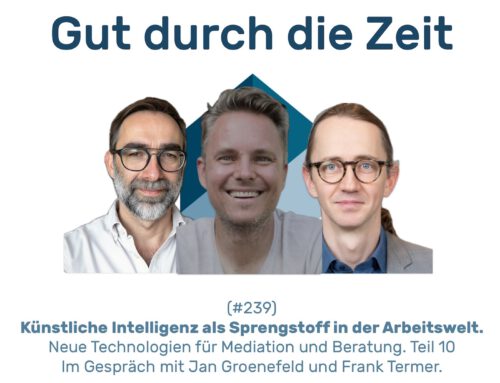INKOVEMA Podcast „Well through time“
# 199 – Perplexed counsellors XI – To which problems of coaches and mediators are artificial intelligences the answer?
Balling-Mohr-Weigel Talks
Dr Sascha Weigel talks to the well-known and experienced consultants Günther Mohr and Rolf Balling on the challenges of artificial intelligence, what problems and tasks they can solve and what their emergence may mean for the highly personalised service of coaching and counselling.
Well through time.
The podcast about mediation, conflict coaching and organisational consulting.
Contents
Chapter
Summary of the conversation
In this episode of „Gut durch die Zeit“ I discuss with Günter Mohr and Rolf Balling, two experienced consultants, the impact of new technologies, especially artificial intelligence (AI), on our work as coaches, mediators and consultants. After a long time without talking together, we came together again to share our thoughts on current developments and their implications for our industry.
Günter describes his personal reflections on his age and the changes that come with it. He encourages people to sort things out in life and focus on the essentials. Rolf talks about how rituals and markers in life can have a deeper meaning and how his view of the world has changed as a result of a change in his professional role.
A central topic of our discussion is the role of AI in our day-to-day consulting work. We shed light on it, whether AI can serve as a toolto make everyday tasks easier, or whether it poses a threat to individual professionalism. In particular, we focus on the possibilities of AI to generate standard answers and optimise processes, while at the same time considering the limitations and weaknesses of the technology. We conclude that the capacity for intuition and emotional perception, the essence of the coaching process, cannot currently be achieved by AI.
We also discuss the potential dangersassociated with the increased integration of AI, including the possibility that access to human therapists and counsellors will be reduced. Technological advances could mean that the need for human interaction in the coaching field is no longer considered as important, which we find worrying. Rolf points out that reliance on AI could also lead to societal problems, especially if people in need instead push for machine solutions that don't provide real support. And Günther draws attention to the economic logic that while AI applications could initially provide therapeutic support for many who would otherwise not be able to benefit from support, this would mean that even less would be invested in human therapists and therapy.
Finally, we reflect on Examples from our own professional lifeWe look back on the years in which we have successfully used AI to make our work easier and ask how we can continue to maintain and promote our expertise and human skills in a changing environment. This discussion leaves us in a state of perplexity, coupled with an open-mindedness towards the possibilities of the future.




Complete transcription




Hey, this is a really exciting topic for the coaching world, especially in this day and age!
We probably all need a little more media literacy – no matter which generation ;)
Have fun with it and best regards! :)